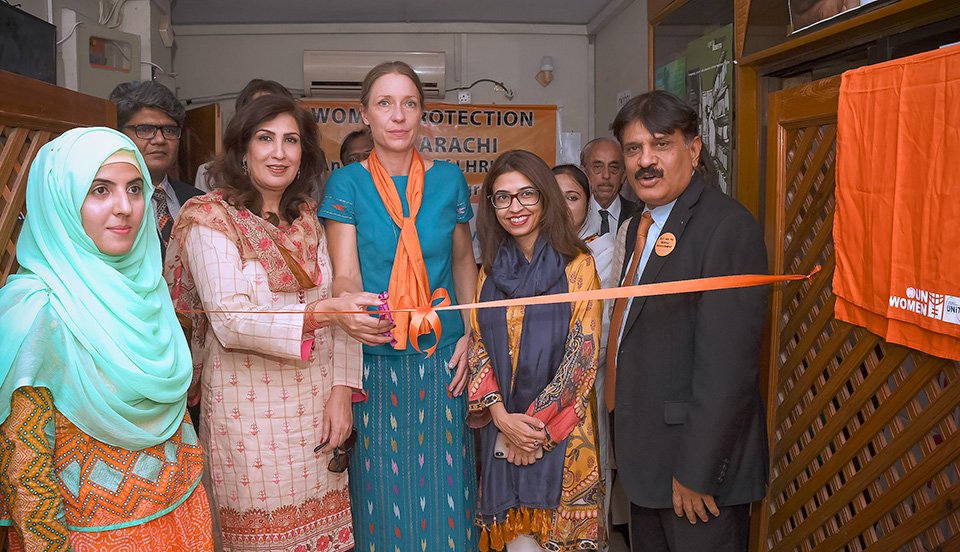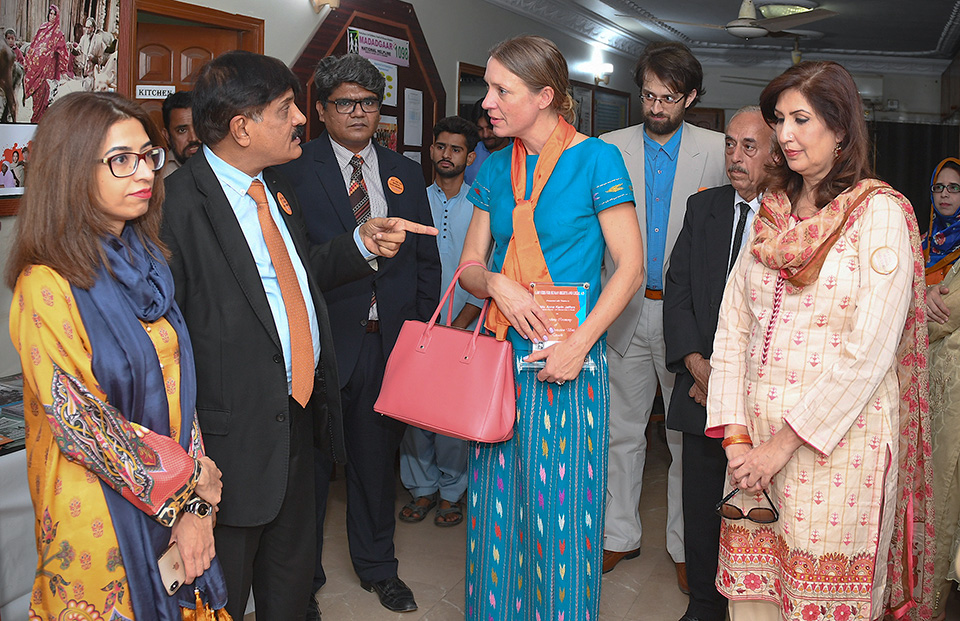Supporting Women Survivors of GBV to Obtain Services and Access Justice
Date:
Authors: Anum Pasha, Saman Ahsan & Habib Asgher


In Pakistan, Violence Against Women and Girls (VAWG) is widespread, normalized and legitimized as a consequence of pervasive gender inequality and deep-rooted patriarchy. Pakistan ranks 148th out of 149 countries according to the World Economic Forum’s Gender Gap report 2018 and 150th out of 153 in the Women, Peace and Security Index.
Gender-Based Violence (GBV) is significant in Pakistan and pervades every class, ethnicity, religion, geographical location and age group. Various studies have demonstrated that women are at risk of physical, emotional and financial abuse both within their households and in public spaces, which prevents them from unlocking their full potential in the social, economic and political spheres. According to the Human Rights Commission of Pakistan (HRCP), 5660 crimes were reported against women in 2017 and these numbers are just the tip of the iceberg, as VAWG is severely under-reported due to various factors such as illiteracy, fear, perception of dishonour and lack of resources to seek justice.
As Pakistani women’s economic, social and cultural rights continue to be overlooked, they experience numerous forms of violence including: physical violence by family members or intimate partners, sexual harassment and abuse by strangers, honour killings, stove burnings, acid attacks, and dowry-related murders. Pakistan is a predominantly male-dominated society where violence is seen as culturally acceptable and the victims’ own belief system prevents them from even recognizing certain forms of violence, such as physical or sexual abuse by an intimate partner. Thus, women who experience violence often do not seek justice and continue to suffer in silence. According to the 2012-13 Pakistan Demographic and Health Survey (PDHS), 52 percent of women who experienced violence had never sought help.
Pakistan’s Response to GBV
The Government of Pakistan has demonstrated its commitment towards empowering women and youth by becoming a signatory to several rights-based international agreements, yet the situation on the ground needs concerted efforts from all stakeholders. The legal framework is not sufficient for addressing the challenges in the implementation of the laws, changing the prevailing mindset or eradicating the social acceptance of gender-based crimes. In addition, there is a lack of infrastructure and systems to support survivors in accessing justice as well as health and social services. Service delivery institutions can play a critical role in providing facilities to women to ensure that their rights are not violated. However, often services available are not of the quality required to adequately support women who experience violence. Law enforcement agencies, lawyers, prosecutors, and judicial staff lack the capacity to prevent these cases, or to record and investigate them properly, collect data, conduct medical examinations, and convict the perpetrators.
Bringing Justice to GBV Victims though Provision of Essential Services
UN Women in Pakistan is scaling up the response to GBV by supporting women’s access to justice through capacity building of partners, provision of quality services to survivors and creation of safe spaces. In order to respond to the need for addressing gender-based violence through infrastructure and services, UN Women in Pakistan collaborated with Lawyers for Human Rights and Legal Aid (LHRLA) through its “Prevention and Protection of Women from Violence through Access to Justice, Services and Safe Public Spaces” project supported by the U.S. Department of State. This project builds upon efforts by the Government and Pakistani civil society to address VAWG through enhancing knowledge and capacity, effecting behaviour change and ensuring appropriate support and quality services for survivors.
Under this project, UN Women Pakistan, Sindh Women Development Department, and LHRLA jointly launched a Women Protection Unit (WPU) in Karachi in 2018 to offer female victims support in the form of expert advice, legal aid, counselling, and guidance on accessing justice. The WPU is linked with Sindh Government’s Women’s Development Department Complaint Cell and other service providers through Madadgaar, a toll-free helpline established to provide telephonic counseling to women and child victims of GBV across Pakistan. During the WPU launch ceremony, President LHRLA Zia Ahmad Awan stated, “Women and girls can approach the protection and prevention services of the WPU through the Madadgaar Helpline 1098 at any hour of night or day.” A second WPU is being operationalized in Khairpur to provide support to women from interior Sindh.
Raising Awareness on GBV Support Services
UN Women Pakistan realizes that the main challenge in addressing GBV is its acceptance as a norm by society at large. This is why UN Women is working to end violence by increasing awareness regarding the causes and consequences of GBV and implementing behavior change strategies in order to promote gender equality. UN Women and LHRLA have collaborated on awareness raising on all forms of violence against women as serious violations of human rights, so that they are fully sensitized on how to seek help and services for when faced with violence or exploitation. Since the start of the project, UN Women and LHRLA have organized awareness sessions in different communities reaching around 500 participants to draw attention to the WPU’s services and address the barriers that prevent women from seeking help when faced with GBV.
Making Noise: Speaking Up Against Violence
Taking action against violence takes courage but it is the first step towards challenging the prevailing mindset and ending the culture of silence. In Pakistan, women are often coerced to stay quiet and are unable to narrate their ordeals which ultimately deprives them from accessing essential support services. Women cannot speak up without fear of retaliation as all forms of violence including domestic violence and sexual harassment are seen as taboo topics; as a result, justice is denied completely to the silent sufferers. Despite these current challenges, UN Women Pakistan has taken up sustained action to promote the need for changing norms and behaviors related to GBV through sensitization campaigns.
Consequently, the success of the WPU in encouraging women to speak up is evident as more than 2,000 females have shared their experiences and sought support from the WPU. These courageous Pakistani women were provided with the services they needed relating to psycho-social counselling, legal advice and aid, and referrals. To further facilitate women and youth, the WPU has introduced a mobile application for VAW incident reporting, so that users can easily report and track their complaints using a mobile phone. Virtual counselling is also available to allow survivors the ease of online services.
A Story of Survival
Among all the cases that the Karachi WPU has dealt with under the Madadgaar helpline in the past year, one story of survival can give testimony to the critical role played by UN Women Pakistan’s support for expanding access to quality multi-sectoral services for survivors and paving the path for justice. This is the story of Dil Jaan - a woman who was forced into marriage with a relative and shortly thereafter became a victim of domestic violence and abuse. Dil Jaan’s family demanded divorce but her husband refused.
One day Dil Jaan learnt about Madadgaar’s services and approached the WPU for help. A WPU representative began dealing with her case and talked about when she first saw her: “She could not even sit in the office properly when she arrived here. She kept standing up and roaming around. Her traumatized condition was unbearable and I was horrified to see her. Still I get waves of shock and fear all over my body when I think of her condition that day.”
The WPU Karachi stepped in thereafter to pursue Dil Jaan’s case for ‘Khula’ – an Islamic procedure wherein a woman can initiate divorcing her husband. Her family was unable to financially afford the legal procedure and formalities so all costs were covered by the WPU. The WPU team was successfully able to free Dil Jaan from the domestic violence being inflicted on her as a result of the forced marriage. “The Madadgaar team took the lead and followed up on our case without any service charges. The WPU helped us take our case to court when no one was listening to us and we did not have any agency. We are grateful and very happy,” explained Dil Jaan’s parents.